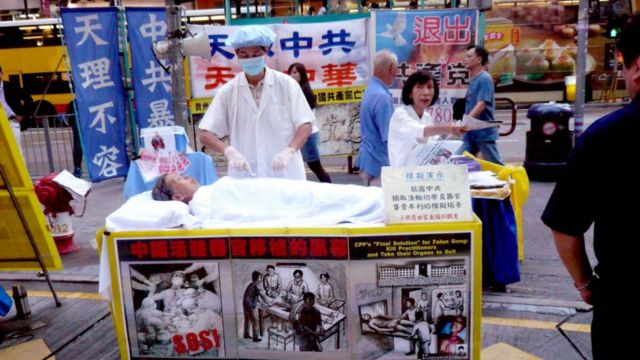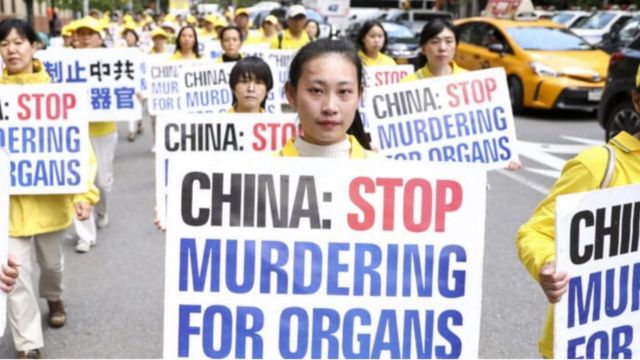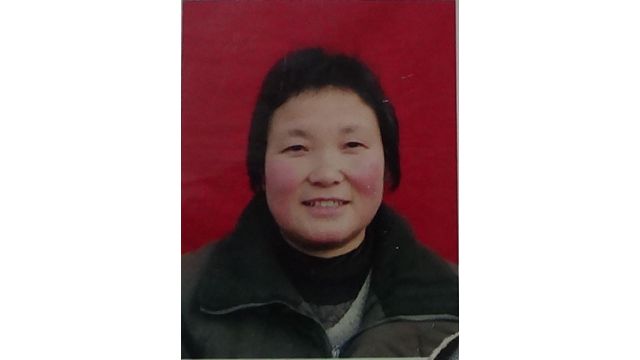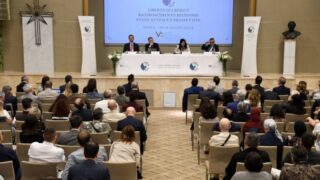CAP-LC and GHRD took the lead in denouncing the criminal practice at the 54th session of the UN Human Rights Council. The Italian government was petitioned on the fate of Ma Xiuyun and Tang Pingshun.
by Marco Respinti


In the year marking the 75th anniversary of the United Nation’s Universal Declaration of Human Rights, two NGOs with ECOSOC consultative status at the UN, the Coordination des Associations et des Particuliers pour la Liberté de Conscience (CAP-LC), based in Paris, France, and the Romanian Independent Society of Human Rights (RISHR), based in Bucharest, Romania, submitted a joint statement to denounce organ harvesting of Falun Gong practitioners in the People’s Republic of China (PRC) at the 54th session of the UN Human Rights Council (11 September–13 October). They were joined and supported by Alianza Iberoamérica Europea Contra el Comunismo (AIECC), China Watch UK (not to be confused with the “China Watch” of the China Watch Institute in Beijing, which is a propaganda arm of the Chinese Communist Party, or CCP), Doctors Against Forced Organ Harvesting (DAFOH), Forum for Religious Freedom Europe (FOREF), the Gerard Noodt Foundation for Freedom of Religion or Belief, the International Society for Human Rights and its branch in Sweden, the International Council for Diplomacy and Dialogue (ICDD), the Korean Association for Ethical Organ Transplants (KAEOT), NPO Transplant Tourism Research Association, the Taiwan Association for International Care of Organ Transplants (TAICOT), and the Rotary Satellite Club of Ending Forced Organ Harvesting.
The joint statement was based on the authority of the research and findings presented in the seminal reports by David Kilgour (1941–2022), David Matas and Ethan Gutman, as well as on the conclusions of the “China Tribunal,” which were also delivered in an executive summary form at the 42nd UN Human Rights Council in Geneva, in September 2019, by Hamid Sabi, a London-based human rights lawyer and counsel to the “China Tribunal” itself.
The statement includes several requests to the UN and its associated agencies. Among them, there are the “call upon the WHO [World Health Organization] that the One Health agenda has to include a verification of the end to forced organ harvesting of Falun Gong in China” (the “One Health agenda” being the holistic consideration of the health of people, animals, and ecosystems as integrated, which the WHO officialized in 2017), the “call upon the UN Secretary General to initiate a fact-finding mission of forced organ harvesting in China via independent, international, unannounced inspections,” and the “call upon the UN Secretary General to inform all 193 member states of the United Nations about China’s persecution of Falun Gong and its unethical forced organ harvesting practice.”
The PRC should be asked—the joint statement continues—to “immediately abide by the guiding principles of the Universal Declaration on Human Rights and end the practice of forced organ harvesting of Falun Gong practitioners and any other prisoners of conscience.” But, of course, this would be only wishful thinking without an adequate UN and international pressure. It is then important to register a few good initiatives already taken: “several countries, including Israel, Canada, and the United States, have initiated or passed legally binding legislations that aim to stop or prevent forced organ harvesting of prisoners in China.” Some of them are cited in the document: the US Congress’ 2016 House Resolution 343 and the European Parliament 2016 Written Declaration 48. To them it is important to add Doctors Against Forced Organ Harvesting (DAFOH )’s reiterated informal petition 2012–2018 to the UN High Commissioner for Human Rights, which in three separate occasions gathered more than 3 million signatures in over 50 countries, and the 2021 statement by 12 Special Rapporteurs to the UN.
All these precedents and elaborations contributed in fact to indict “state-sanctioned, forced organ harvesting of living people, i.e., killing people for their organs,” which is what regularly happens in the PRC, as “crimes against humanity,” and making “the persecution of Falun Gong by the Chinese government […] one of the most investigated, yet largely ignored persecution of a spiritual-religious groups in the 21st century.”


Organ harvesting expands
Similarly denouncing this horrendous practice, on May 26, 2023, a third ECOSOC-accredited NGO at the UN, Global Human Rights Defence (GHRD) based in The Hague, The Netherlands, submitted a written statement at the UN 54th Human Rights Council (19 June–14 July). “Too often,” the statement says, “the government of the PRC has eluded questions and mocked reports as being mere fantasy. Unfortunately, these reports reflect reality. It is urgent that independent, bipartisan, non-confessional, and non-political investigations are carried out in the PRC to establish the truth. Official statistics produced by the PRC have been questioned by experts many times; it is time to discuss them openly and publicly with international experts. Numbers must be verified, practices must be verified, criminals must be indicted. Forced organ harvesting is a disgrace that the world must not overlook any longer.”
On the same occasion, GHRD submitted also another written statement aimed at the crimes committed by the CCP in the PRC against religious groups, ethnic minorities, dissidents and opposers. This second document highlighted that “[c]oncerns over the situation of Tibet deepen when considering that the PRC’s neglect of fundamental identity features such as language, traditions, and religions are formidable tools which serve projects for the total annihilation of entire peoples. Such worries are further exacerbated by the forced harvesting of human organs, the black market for which is unfortunately flourishing in Asia, and which often makes use of DNA tests, sampling, and database to select its victims. These serious violations of the human rights of Tibetan people must come to an end, and the PRC must come into compliance with the ICESCR to ensure their fundamental and inherent rights as human beings.” ICESR is the International Covenant on Economic, Social and Cultural Rights, a multilateral treaty adopted by the UN in 1966 and building on the “Universal Declaration of Human Rights.”
The two statements—to whose drafting I collaborated myself—are connected. In fact, DNA tests that map the genomes of populations and serve to detect possible hereditary genetic diseases, or a person’s predisposition to maladies, and in general to ascertain the general health condition of a human being, may reveal dreadful ties to organ pillaging, at least to select apt victims. This enlarges the horrifying magnitude of the crime. In fact, while Falun Gong practitioners remain the historical and the major target of organ harvesting, this practice is now being extended to other communities, including Tibetans, Uyghurs, and groups less well-known abroad such as The Church of Almighty God.


American researcher Ethan Gutmann insisted on this important aspect, also in his testimonies before the China Tribunal and the Uyghur Tribunal. I had several opportunities to discuss the topic directly with him. Gutmann is Senior Research Fellow in China Studies at the Victims of Communism Memorial Foundation in Washington, D.C., the co-founder of the International Coalition to End Transplant Abuse in China (ETAC), and the third author of the on-going essential research on human harvesting conducted by the late former Canadian MP David Kilgour and Canadian lawyer David Matas.
An appeal to save victims
While the reality of organ predation in the PRC gains growing attention on different media outlets, the victims of these monstrosity are not theoretical. They are real people in flesh and blood, with names and faces that “Bitter Winter,” among others, try to list and publicize as much as possible. This is for example the case of Ma Xiuyun and Tang Pingshun, whose story was told earlier by “Bitter Winter.”
They are the parents of a Falun Gong practitioner who now resides in Italy and for this reason on August 15, 2023, Katerina Angelakopoulou, President of the Associazione Italiana Falun Dafa, wrote to the head of the Italian government and several ministers. She pleaded: “We turn to you asking for your support toward their release, conveying to the Chinese authorities the respect Italy has for human rights and asking them to stop the persecution of Falun Gong practitioners, a crime against humanity that cannot be accepted by any democratic country like ours.” [Ci rivolgiamo a Voi per chiederVi sostegno per la loro liberazione, trasmettendo alle autorità cinesi il rispetto che ha l’Italia per i diritti umani e chiedendo loro di fermare la persecuzione verso i praticanti del Falun Gong, un crimine contro l’umanità che non può essere accettato da alcun Paese democratico come il nostro.]
Angelakopoulou’s certified email carried also the Italian translation of the “Bitter Winter” article on the Ma and Tang case, and was delivered to Prime Minister Giorgia Meloni, Minister of Interior Matteo Piantedosi, Minister of Foreign Affairs Antonio Tajani, Minister of Justice Carlo Nordio, Minister of Defense Guido Crosetto, and Minister of Economy Giancarlo Giorgetti. At this date, the email has received no answers.









